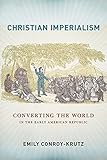Christian imperialism : converting the world in the early American republic / Emily Conroy-Krutz.
Material type: TextSeries: Publication details: Ithaca : Cornell University Press, (c)2015.Description: 1 online resourceContent type:
TextSeries: Publication details: Ithaca : Cornell University Press, (c)2015.Description: 1 online resourceContent type: - text
- computer
- online resource
- 9781501701047
- BV2410 .C475 2015
- COPYRIGHT NOT covered - Click this link to request copyright permission: https://lib.ciu.edu/copyright-request-form
| Item type | Current library | Collection | Call number | URL | Status | Date due | Barcode | |
|---|---|---|---|---|---|---|---|---|
 Online Book (LOGIN USING YOUR MY CIU LOGIN AND PASSWORD)
Online Book (LOGIN USING YOUR MY CIU LOGIN AND PASSWORD)
|
G. Allen Fleece Library ONLINE | Non-fiction | BV2410 (Browse shelf(Opens below)) | Link to resource | Available | ocn919921508 |
Browsing G. Allen Fleece Library shelves, Shelving location: ONLINE, Collection: Non-fiction Close shelf browser (Hides shelf browser)
Includes bibliographies and index.
Introduction : Christian imperialism and American foreign missions -- Hierarchies of heathenism -- Missions on the British model -- Mission schools and the meaning of conversion -- Missions as settler colonies -- American politics and the Cherokee mission -- Missionaries and colonies -- A "Christian colony" in Singapore -- Conclusion : missions and American imperialism.
"In 1812, eight American missionaries, under the direction of the recently formed American Board of Commissioners for Foreign Missions, sailed from the United States to South Asia. The plans that motivated their voyage were no less grand than taking part in the Protestant conversion of the entire world. Over the next several decades, these men and women were joined by hundreds more American missionaries at stations all over the globe ... In describing how American missionaries interacted with a range of foreign locations (including India, Liberia, the Middle East, the Pacific Islands, North America, and Singapore) and imperial contexts, Christian Imperialism provides a new perspective on how Americans thought of their country's role in the world. While in the early republican period many were engaged in territorial expansion in the west, missionary supporters looked east and across the seas toward Africa, Asia, and the Pacific. Conroy-Krutz's history of the mission movement reveals that strong Anglo-American and global connections persisted through the early republic. Considering Britain and its empire to be models for their work, the missionaries of the American Board attempted to convert the globe into the image of Anglo-American civilization."--Publisher's description.
COPYRIGHT NOT covered - Click this link to request copyright permission:
There are no comments on this title.







